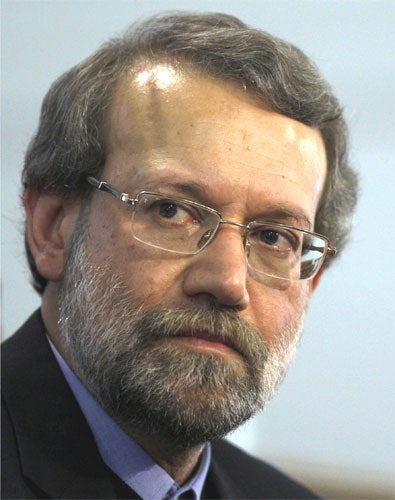Iran 'will comply over uranium'
Tehran accuses US of stirring up Iran-phobia in Middle East - then Ahmadinejad signals he will comply with UN

Your support helps us to tell the story
From reproductive rights to climate change to Big Tech, The Independent is on the ground when the story is developing. Whether it's investigating the financials of Elon Musk's pro-Trump PAC or producing our latest documentary, 'The A Word', which shines a light on the American women fighting for reproductive rights, we know how important it is to parse out the facts from the messaging.
At such a critical moment in US history, we need reporters on the ground. Your donation allows us to keep sending journalists to speak to both sides of the story.
The Independent is trusted by Americans across the entire political spectrum. And unlike many other quality news outlets, we choose not to lock Americans out of our reporting and analysis with paywalls. We believe quality journalism should be available to everyone, paid for by those who can afford it.
Your support makes all the difference.In a day of curiously mixed signals, the regime in Tehran yesterday accused the United States of stirring "Iran-phobia" in the Middle East by laying plans to deploy new missile defences in the region, yet only hours later suggested that it was ready after all to accept a compromise deal to end the stand-off with the West over nuclear arms.
Speaking on state television, President Mahmoud Ahmadinejad said he could agree to sending partially enriched uranium to foreign countries for processing into fuel rods that would then be returned to Iran. Thus he outlined more or less what the United Nations has asked of Iran in recent negotiations, but which it had previously rejected.
Mr Ahmadinejad said he would have "no problem" with the arrangement and dismissed critics within Iran who have worried publicly that foreign powers would take the uranium and never return it. Fuel rods are suitable for civil atomic uses like energy generation but not for the making of nuclear armaments.
The comments came as the US and its allies at the UN are preparing to debate a fourth round of sanctions against Iran, which could include blacklisting the central bank. With China still showing little enthusiasm for sanctions and Russia also blowing hot and cold, a more severe package with a ban on imported refined fuels is no longer on the table.
Mr Ahmadinejad's words contrasted starkly with the rhetoric unleashed earlier about the missile shield deployments. The Pentagon is preparing to expand patriot land defensive systems in Kuwait, Qatar, the United Arab Emirates and Bahrain. The move is partly to counter the existing ballistic capabilities of Iran, which, according to a Pentagon report released this week, represents a "significant" threat to US and allied forces in the Gulf region.
"Regional countries should know that this puppet show by the US, while claiming to create security in the region, is nothing except a new political ploy to increase the military presence at the expense of others," the Parliamentary Speaker Ali Larijani complained.
"We regard these measures as a conspiracy by foreign countries to create a sense of Iran phobia," the foreign ministry spokesman Ramin Mehmanparast added. "Relations between the Islamic Republic of Iran and the other countries in the region are very good and friendly."
President Ahmadinejad, attending talks yesterday with the Crown Prince of Qatar, Tamim bin Hamad bin Khalifa al-Thani, had accused Washington of seeking to undermine peace in the area. "They have always tried to keep the countries of the region weak, and their existence dependent on division and insecurity," he argued. So it was something of a surprise when he later appeared to soften his stance on the nuclear issue. However, Iran has a long history of appearing to embrace compromise with the West only to back off later.
The US State Department said that if Iran was serious about a deal they should take it directly to the International Atomic Energy Agency, which is responsible for nuclear inspections
President Ahmadinejad and his government turned their focus on the US just as domestic political opposition seemed ready to escalate, with the state preparing to hang nine more rioters arrested during the unrest after last summer's disputed elections. Two alleged dissidents were hanged last week.
The opposition leader, Mirhossein Mousavi, argued on his website yesterday that the repression showed that the 1979 Islamic revolution "had not achieved its goals".
In his television appearance, the President also said that he was ready to enter into a prisoner a swap with the US under which he would release three US hikers who were imprisoned after straying onto Iranian soil last summer while Iranians in custody in the US would also be released. Which Iranians he had in mind is unclear, and such a deal is highly unlikely to interest Washington.
Subscribe to Independent Premium to bookmark this article
Want to bookmark your favourite articles and stories to read or reference later? Start your Independent Premium subscription today.
Join our commenting forum
Join thought-provoking conversations, follow other Independent readers and see their replies
Comments